From: Selpercatinib (Retevmo)

Selpercatinib (Retevmo): CADTH Reimbursement Recommendation: Indication: Adult patients with rearranged during transfection (RET) fusion-positive differentiated thyroid carcinoma with advanced or metastatic disease (not amenable to surgery or radioactive iodine therapy) following prior treatment with sorafenib and/or lenvatinib [Internet].
Copyright © 2022 Canadian Agency for Drugs and Technologies in Health.
Except where otherwise noted, this work is distributed under the terms of a Creative Commons Attribution-NonCommercial-NoDerivatives 4.0 International licence (CC BY-NC-ND), a copy of which is available at http://creativecommons.org/licenses/by-nc-nd/4.0/
NCBI Bookshelf. A service of the National Library of Medicine, National Institutes of Health.
